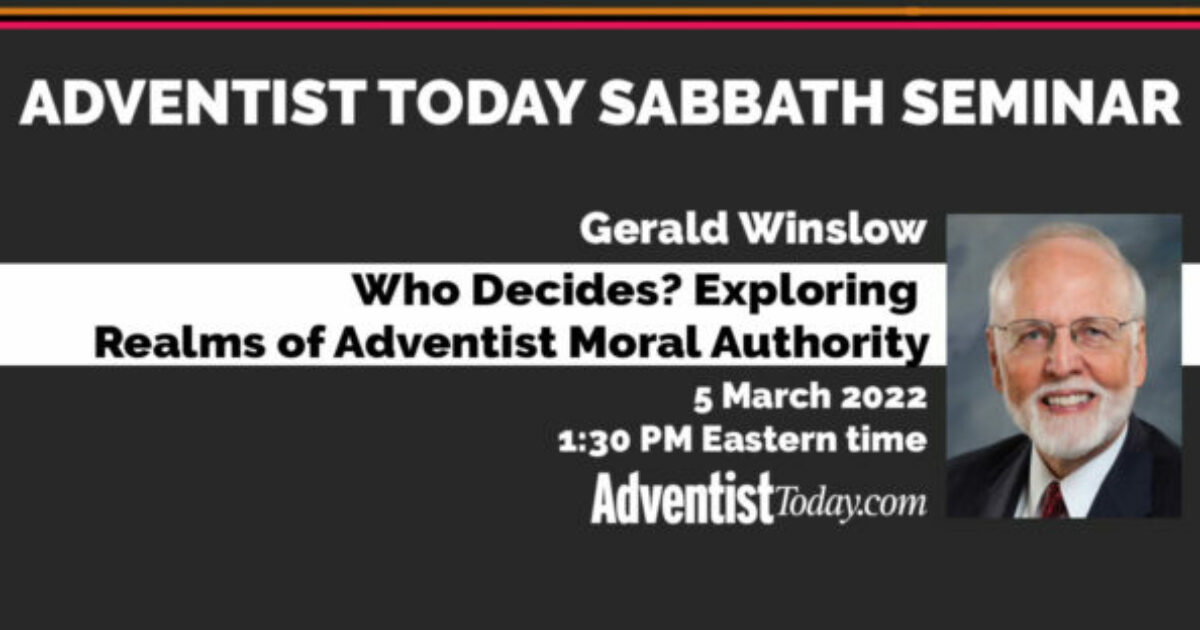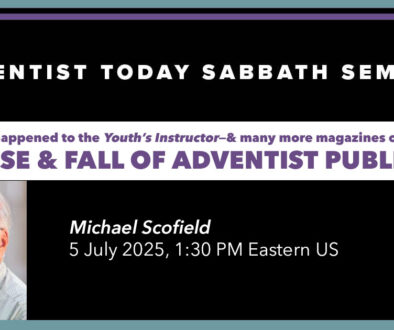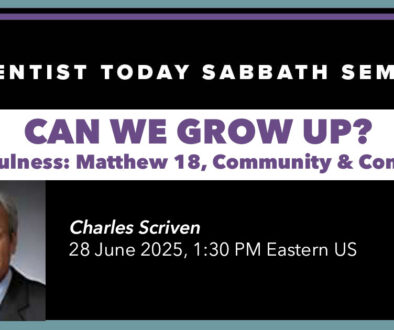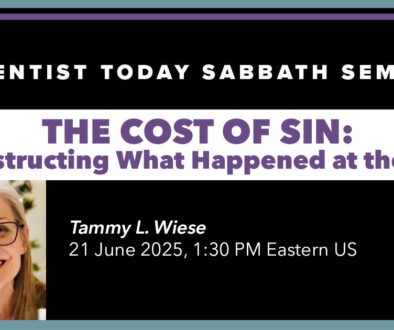ATSS: Who Decides? Exploring Realms of Adventist Moral Authority
2 March 2022 |
by Gerald Winslow
I look forward to meeting with the AT Sabbath Seminar this coming Sabbath. For those who would benefit from study of a passage from Scripture, let me propose Acts 15, the entire chapter. That’s a bit long for a memory verse. But, if you’re willing, you’ll have opportunity to share which verse or two, in your view, from this chapter provides principled help in knowing how members of the church might best resolve differences of convictions about ethics.
We’ll begin by thinking together about what it means to study and practice Christian ethics. As one who has spent well over five decades attempting to teach that subject to university students in Adventist higher education, I will offer some reflections.
Then we will turn to the main question:
-
- How is moral authority best understood and exercised in a worldwide church when there are deep divisions about so many ethical questions?
- Who’s in charge?
- Who decides?
My hope is not that we’ll amaze each other with completely compelling answers to these questions. As we can learn from Acts 15, and many other biblical passages, there have always been times in the history of Christianity when there were passionately held opposing positions among believers about ethics. Does this represent a failure of faith? And how can we proceed with the mission of the church when such differences are still unresolved?
In order to give added focus to our conversation, we will consider some of the issues currently needing attention in the North American Division, especially as those affect health care. Such questions are not limited to the usual arguments about abortion and euthanasia. There is need for clarity about the treatment of LGBTQ+ persons, about health equity and racial justice, about mandatory vaccinations, and many other pressing matters. We will have time to look at the current collaboration of the Adventist Health Policy Association and the Adventist Bioethics Consortium as they seek to address such issues.
But, one may ask, who authorized these organizations to “speak for the church”? To what extent should leadership in tackling such questions be exclusively the task of one or another level of church administration? Is it better to have no stated positions on these ethical issues and simply leave them to the personal convictions of individual members? If so, what do Adventist institutions such as our universities or hospitals say to the public (or even to the institutions’ own employees) about what the Adventist positions are?
Because work on questions of this sort is what constitutes my “day job,” I’m looking forward to receiving your best help this coming Sabbath.
Teacher:
Gerald R. Winslow is research professor of Religion at Loma Linda University (LLU) and founding director of the Institute for Health Policy and Leadership. He received his B.A. from Walla Walla University and M.A. from Andrews University. He then earned his PhD from the Graduate Theological Union in Berkeley. Beyond his current roles at LLU, he has worked at Cambridge University, University of Virginia, and the University of Tübingen as a visiting scholar. Academically, Dr. Winslow has published multiple books, including Triage and Justice with the University of California Press and Facing Limits (edited also by James Walters) with Westview Press. His articles have appeared in academic journals such as the Western Journal of Medicine, the Journal of Pediatrics, the Hastings Center Report, the Journal of Medicine and Philosophy, and General Dentistry. His expertise in biomedical ethics has been appreciated in lectures throughout North America, Australia, Europe, Russia, Africa, and Asia. He has also been consulted by major healthcare systems, pharmaceutical companies, and advisory boards.
Moderator:
How to join:
You can watch the presentation here.
When:
ATSS starting time depends on where you are. If you’re on the west coast of the United States, it’ll be 10:30 AM. On the east coast, 1:30 PM.
Times around the world:
-
- Reykjavík: 6:30 PM
- College Place: 10:30 AM
- Lincoln: 12:30 PM
- Denver: 11:30 AM
- Bracknell: 6:30 PM
- Loma Linda: 10:30 AM
- Nairobi: 8:30 PM
- Gackle: 12:30 PM
- Hosur: 11:00 PM
- Waco: 12:30 PM
- Tulsa: 12:30 PM
- Helsinki: 8:30 PM
- Stockholm: 7:30 PM
- Hamburg: 7:30 PM
- Cape Town: 7:30 PM
- Madrid: 7:30 PM
- Paris: 7:30 PM
- Honolulu: 7:30 AM
- Cooranbong: 5:30 AM (Sunday)
- Perth: 2:30 AM (Sunday)
The class is intended to last about 2 hours, though the conversation often continues to 4 PM on the east coast of the United States.
About our class:
- The AT Sabbath Seminar is intended to be a courteous forum. We discuss and ask questions politely. We don’t accuse, get angry, or put people down.
- Stick to the topic in both comments and chat discussion.
- Make your comments and questions short—don’t dominate.
- Keep your microphones muted unless you are called upon to make your comment or ask your question.
- Indicate your interest in speaking by raising your electronic hand—under the “reactions” button.
- Please use your name when you sign in! Not your phone number, not your initials. This will help us differentiate you from unwelcome guests who want to disrupt us. You can set your name after signing on by clicking on the 3 dots next to your picture, which drops down a menu.
- If it should happen that we are attacked so that we have to stop the meeting, we’ll quickly post a new meeting link on our AT Facebook page.
We look forward to getting acquainted with you!
Coming up:
- Maury Jackson




